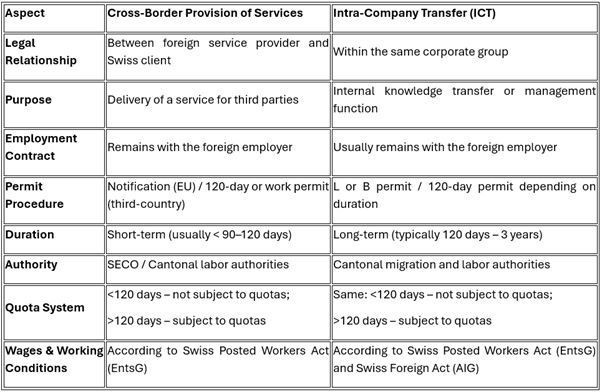- in North America
- in North America
- Introduction
In a globalized economy, professionals and services are increasingly provided across borders. In Switzerland, however, it is crucial to distinguish between cross-border provision of services and intra-company transfers (ICTs). Both forms have different legal bases, permit procedures, and practical implications for companies and employees.
This article highlights the key differences between these two arrangements and illustrates the relevant aspects with practical case studies.
- Cross-Border Provision of Services
Definition
A cross-border provision of services occurs when a company based abroad temporarily posts employees to Switzerland to perform a service for a Swiss client.
The assignment takes place within the framework of a service contract between the foreign employer and the Swiss client.
Legal Framework
- EU / EFTA citizens: Based on the Agreement on the Free Movement of Persons (AFMP). Simplified notification procedures apply (up to 90 days per calendar year).
- Third-country nationals: Subject to the Foreign Nationals and Integration Act (FNIA) and the Ordinance on Admission, Period of Stay and Gainful Employment (VZAE). Work permits are required.
- Working conditions: Must comply with Swiss minimum standards according to the Posted Workers Act (EntsG).
Key Characteristics
- The client and employer are different legal entities.
- The work is performed for a Swiss client.
- The stay is project-based and temporary (typically 3–6 months).
- The employment relationship remains with the foreign employer.
- For longer assignments requiring a work permit, a project and posting contract must be submitted.
Case Study: IT Project in Basel
A German software company is contracted to develop an interface for a Swiss pharmaceutical company's IT systems. It sends three IT specialists to Basel for 60 days.
The employees remain employed by the German company, which provides the service under a project agreement.
Because they are EU citizens and the assignment lasts less than 90 days, the notification procedure applies—currently managed via the EasyGov platform. No work permit is required, but Swiss wage and labor conditions must be observed. For the duration of the posting, the foreign employer must cover all accommodation, meal, and transport costs in Switzerland.
- Intra-Company Transfer (ICT)
Definition
An intra-company transfer (ICT) occurs when an employee is transferred within the same corporate group from a foreign company to a Swiss subsidiary, branch, or affiliate. The goal is typically knowledge transfer or operational support within the group.
Legal Framework
- Article 19a VZAE: Implementation of EU Directive 2014/66/EU for third-country nationals.
- Eligible categories:Executives/ManagersSpecialists with company-specific expertiseTrainees for internal corporate training
- Duration: Generally up to 3 years (1 year for trainees)
Key Characteristics
- Employer and place of work are part of the same corporate group.
- The assignment serves internal coordination or knowledge transfer.
- The assignment is temporary; the employment relationship may remain abroad.
- Work authorization required (L or B permit, depending on duration). An assignment letter is usually sufficient to obtain the permit.
Case Study: Financial Specialist in Zurich
A U.S. financial specialist is seconded from the New York headquarters to the Zurich subsidiary for 24 months to implement a global reporting system.
The Swiss entity applies for an L permit with the cantonal Office for Economy (AWI). After successful review, the employee receives the residence and work permit, including a type D visa. The salary is adjusted to the Swiss level.
- Comparison Table: Provision of Services vs. Intra-Company Transfer

- Conclusion
While cross-border service provision primarily targets external projects and short-term assignments, intra-company transfers focus on internal knowledge transfer and global management processes.
For companies, it is essential to correctly classify each case, as permit requirements, deadlines, and responsible authorities differ significantly.
A misclassification can lead to labor and immigration law complications.
- Recommendations
Companies with regular assignments in Switzerland should establish clear internal processes:
- Pre-assessment of the assignment type (service provision vs. transfer)
- Early submission of necessary permit applications
- Salary benchmarking using the Swiss Salarium tool and compliance with local standards
- Comprehensive documentation for cantonal authorities
Coordinated HR and legal management ensures that international mobility is smooth, compliant, and efficient.
The content of this article is intended to provide a general guide to the subject matter. Specialist advice should be sought about your specific circumstances.

